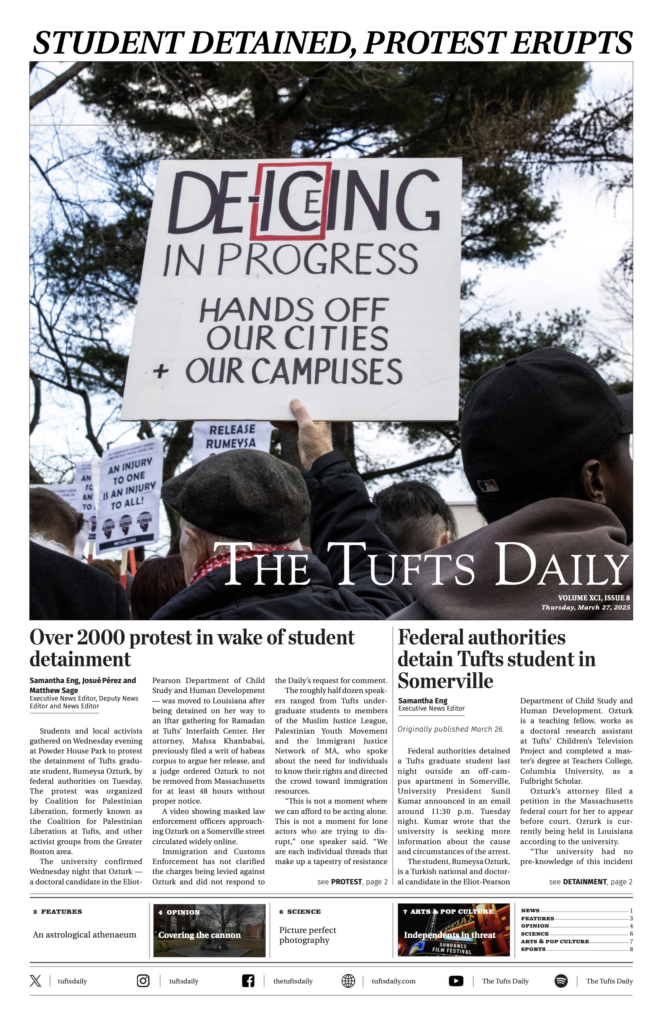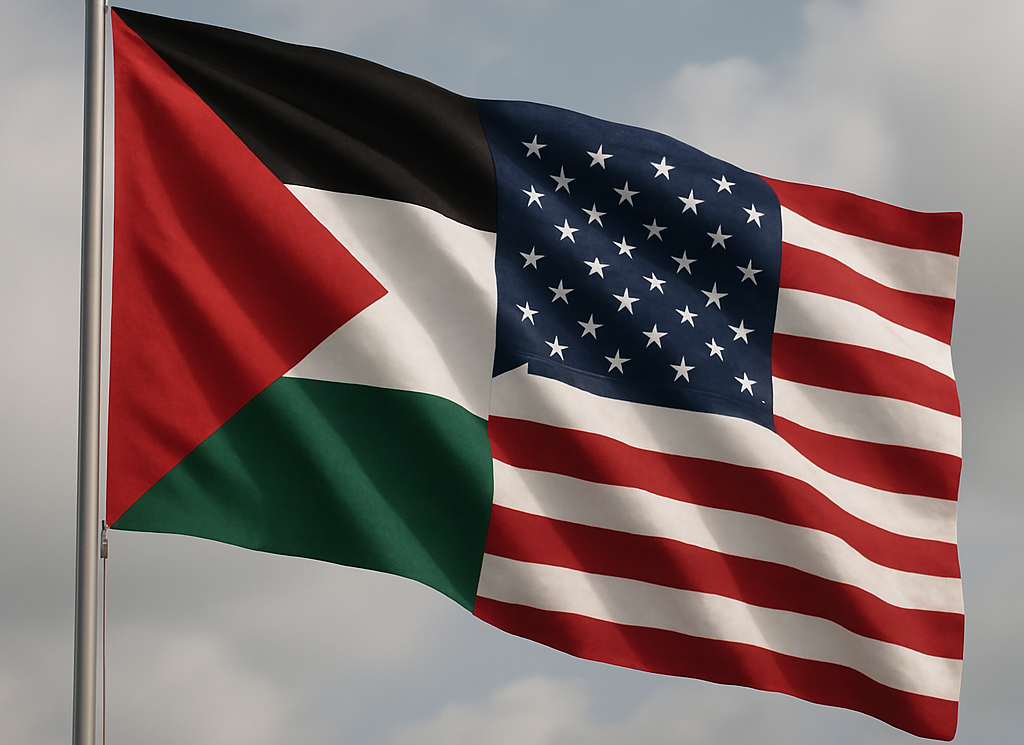What happened, what’s happening and what it could mean for STLCC students
BY: HIBA OBEED, RYDER GEORGE-LANDER, & JACOB POLITTE
Staff and Managing Editor
On March 8th, 2025, Palestinian student activist Mahmoud Khalil, 30, was detained as he and his wife were returning home. As of press time, he remains detained in a detention center in Juna, Louisiana. According to AP NEWS, agents from The U.S. Department of Homeland Security (DHS) told Khalil and his wife that his student visa had been revoked.
Khalil’s wife, a U.S. citizen, attempted to use documents to prove her husband was a green-card holder, only to be told by agents that those would also be revoked, according to a lawsuit filed by Khalil’s attorney. Khalil now faces the possibility of deportation as he is accused by the Department of Homeland Security of “activities aligned to Hamas, a designated terrorist organization.”
According to CNN, Khalil is a pro-Palestinian activist and graduate student at Columbia University in New York. He was chosen by the student group Columbia University Apartheid Divest, to lead discussions with administrators for demanding the schools divestment in the American support of Israel. According to the Council on Foreign Relations, 3.8 billion dollars goes to Israel per year. He is an significant figure in the pro-Palestinian protests taking place at Columbia University throughout the past year and a half, making him a target for President Trump’s “crack-down” on pro-Palestinian protests, an issue that the current President thinks the previous one failed to handle.
Trump Administration cracks-down and doubles-down, in spite of legal challenges and public backlash
Khalil’s detainment, as well as the detainment of other activists, is an ongoing effort by the current Trump administration to “crack-down” on what they claim is illegal immigration and domestic terrorism. This is in spite of concerns regarding the right to due process for deportees of any kind, concerns that Trump Administration member Tom Homan dismissed while discussing a separate case about Venezuelan gang members on ABC’s “This Week” with Jonathan Karl.
“We’re going to continue to arrest public safety threats and national security threats,” Homan told Karl. “We’re going to continue to deport them from the United States.”
According to an article by the New York Times, Alan Yaspan, a fellow student at Columbia University who identifies as Jewish said, “I support immigrants’ rights and freedoms and I support the Palestinian fight for liberation,” going on to elaborate, “Mahmoud Khalil was exercising rights everyone is entitled to.”
President Trump went on to post on Truth Social regarding Khalil’s detainment. “ICE proudly apprehended and detained Mahmoud Khalil, a Radical Foreign Pro-Hamas student on the campus of Columbia University,” said Trump. “This is the first arrest of many to come.”
A CNN article published on March 11 goes on to say, “A federal judge blocked any immediate effort by the Trump administration to deport Khalil, late Monday afternoon. Judge Jesse Furman ordered a hearing on Khalil’s case to be held Wednesday morning in New York City.”
Issues raised by both sides over the case’s jurisdiction have left Khalil in Louisiana.
Ironically, according to the National Criminal Justice Association, the 1952 law that the Trump Administration is currently attempting to use to justify deporting Khalil was ruled unconstitutional by President Trump’s own sister, the late Judge Maryanne Trump-Barry, in 1996.
STLCC Police decline interview
When asked, Captain Benjamin Talley declined an interview request and Police Director Alfred Adkins redirected any questions to the STLCC Campus Free Expressions Guidelines.
The STLCC website states, “The outdoor areas of St. Louis Community College have been designated a traditional public forum under state law. Therefore, expressive activities including, but not limited to, peaceful assembly, protests, speeches, distribution of literature, carrying signs, and circulating petitions, should take place in outdoor areas of campus.
Individuals or groups who engage in expressive activities allowed in outdoor areas must not:
- Be within 20 feet of the normal access, ingress, or egress to or from any building or portion of one, including walkways that connect such buildings.
- Engage in any activity that endangers physical safety and/or results in damage to personal or College property.
- Significantly disrupt College activities inside or outside of buildings.
- Utilize any amplification device.
- Interfere with the ability of vehicles to enter or exit a roadway.
- Obstruct vehicular or pedestrian traffic.
- Force or attempt to force individuals to accept leaflets or other materials.
- Affix items to permanent structures such as buildings, trees, posts, etc.
- Light any material on fire with the exception of hand-held candles, which may be used with special permission. Other open flame devices are strictly prohibited.
- Lasts longer than 8 hours in a 24-hour period during daylight hours.
- Use tents or other shelters.
- Solicit or promote for-profit products or services.
- Create a threat to public safety.”
Dr. Braddix speaks out on what students can do
Chief Engagement Officer D’Andre Braddix said, “For anyone who is unhappy with what is occurring in our country right now, the best way to take action is through the power of civic engagement. This includes staying informed of current events, showing up to vote in elections (local, state, and federal), volunteering your time, and advocating for the causes important to you. Your vote is your voice and your power.”
Braddix continued, “Unfortunately, in the 2024 election, only about 42% of people aged 18-29 chose to exercise their power by casting a vote. With the midterm elections coming up in November 2026, there is another opportunity to mobilize younger voters and make your voices heard.”
More than Khalil
The targeting of protesters protected under the first amendment did not start with Khalil, and has not ended with him, as seen by the detainment of Tufts University doctoral student Rumeysa Ozturk just last week. Ozturk was picked up by masked ICE agents while walking alone on the street near her home in Massachusetts. She had previously signed her name, along with many others, onto an Op-Ed for the Tufts University newspaper, The Tufts Daily. Ozturk has sued to prevent her deportation, while The Tufts Daily reported on Sunday that over 30 US Senators and other members of Congress have demanded more information regarding the matter. The Tufts Daily reported that over 2,000 people have protested Ozturk’s detainment.

Despite this, Secretary of State Marco Rubio said during a press conference last Thursday that Ozturk’s visa was revoked.
“If you apply for a visa to enter the United States and be a student, and you tell us that the reason why you’re coming to the United States is not just because you want to write op-eds, but because you want to participate in movements that are involved in doing things like vandalizing universities, harassing students, taking over buildings, creating a ruckus, we’re not going to give you a visa,” Rubio said at the conference.
Khalil was also not the only Columbia student detained recently. In an article published March 14, 2025 on the DHS website, the DHS say, “student Leqaa Kordia, a Palestinian from West Bank, was arrested by ICE HSI Newark officers for overstaying her expired F-1 student visa.” Kordia was also previously arrested in April of 2024 for her involvement in “pro-Hamas” protests at Columbia University.











